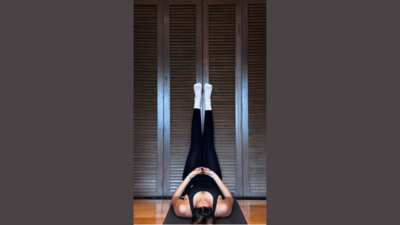Trending
Deepika Padukone highly recommends this yoga pose with profound benefits for women
Expecting actress Deepika Padukone posted a photo of herself doing Viparita Karani, a yoga pose, on Instagram. She highlighted its benefits during pregnancy, like reducing heaviness and swelling. The article elaborated on other advantageous yoga poses and safety tips for pregnant women. Yoga's positive effects on mental and physical health during pregnancy were underscored.

Mom-to-be Deepika Padukone amazed her fans and followers by sharing a photo of her on Instagram where she is doing Viparita Karani, a yoga pose where one puts legs up on the wall. Captioning the breathtaking picture, Deepika explains: In Sanskrit, *viparita* means “inverted” and *karani* translates to “in action.” This active inversion position is also called the restful inversion.

She recommends this yoga for pregnant women as it relieves feelings of heaviness and aching muscles, joints, swollen ankles and feet, reduces pressure on the lower back and hips and alleviates water retention.

However, Viparita Karani is not advisable for those who have high blood pressure.
Deepika's post has gained over a million views over social media which makes it imperative to learn about the impact and importance of yoga on pregnancy.
"Yoga and pranayamas can train you to breathe deeply and relax consciously, helping you face the demands of labor and childbirth. Pregnancy Yoga helps alleviate the effect of common symptoms such as morning sickness, painful leg cramps, swollen ankles, and constipation," according to Art of Living.
Here are a few yoga poses women can try during pregnancy
This gentle flow between Cat and Cow poses helps to loosen the spine, improve flexibility, and ease tension in the lower back and hips.
How to do it
Start on your hands and knees, with your wrists directly under your shoulders and your knees under your hips.
Inhale as you arch your back, lowering your belly towards the mat (Cow Pose).
Exhale as you round your back towards the ceiling, tucking your chin to your chest (Cat Pose).
Repeat this flow slowly, syncing your breath with each movement.
Bound Angle Pose (Baddha Konasana)
This pose helps open the hips and groin area, which can be especially tight during pregnancy. It also stimulates circulation in the pelvic region.
How to do it
Sit on the floor and bring the soles of your feet together in front of you, allowing your knees to drop out to the sides.
Hold your feet with your hands, keeping your spine long and your shoulders relaxed.
You can gently flap your knees up and down to release tension.
Warrior Pose (Virabhadrasana)
Warrior strengthens the legs, opens the hips, and builds concentration and stamina. It also encourages deep breathing.
How to do it
Begin standing with your feet wide apart.
Turn your right foot out 90 degrees and your left foot slightly inward.
Bend your right knee over your right ankle, keeping your left leg straight.
Raise your arms to shoulder height, palms facing down, and gaze over your right hand.
Goddess Pose (Utkata Konasana)
This pose strengthens the lower body and pelvic floor muscles while improving balance and circulation.
Debina Bonnerjee's message for society to stop judging IVF babies & their parents
How to do it
Stand with your feet wide apart and turn your toes out slightly.
Bend your knees deeply over your ankles, keeping your thighs parallel to the floor.
Bring your palms together at your heart center, elbows pressing against your inner thighs.
Hold the pose while breathing deeply for several breaths.
Child's Pose (Balasana)
A deeply relaxing pose that helps to relieve back and neck pain, reduce stress, and promote emotional well-being.
How to do it
Kneel on the floor with your big toes touching and knees apart.
Sit back on your heels and lower your torso between your thighs.
Extend your arms in front of you or rest them alongside your body with palms facing up.
Relax your forehead to the mat and breathe deeply into your back.
Tips for practicing Yoga safely during pregnancy
Consult with your healthcare provider before starting any new exercise routine.
End of Article
FOLLOW US ON SOCIAL MEDIA











